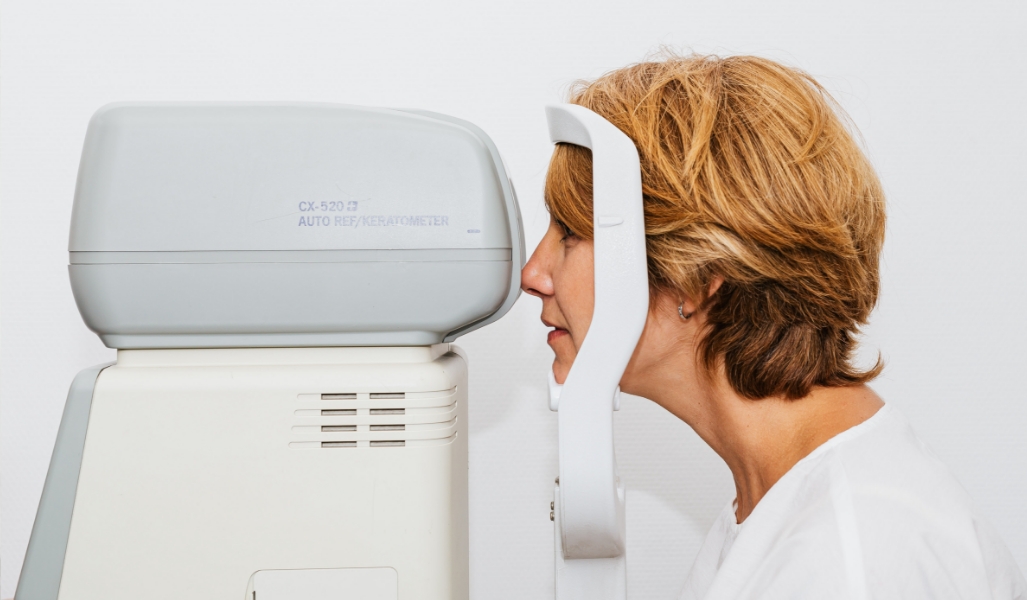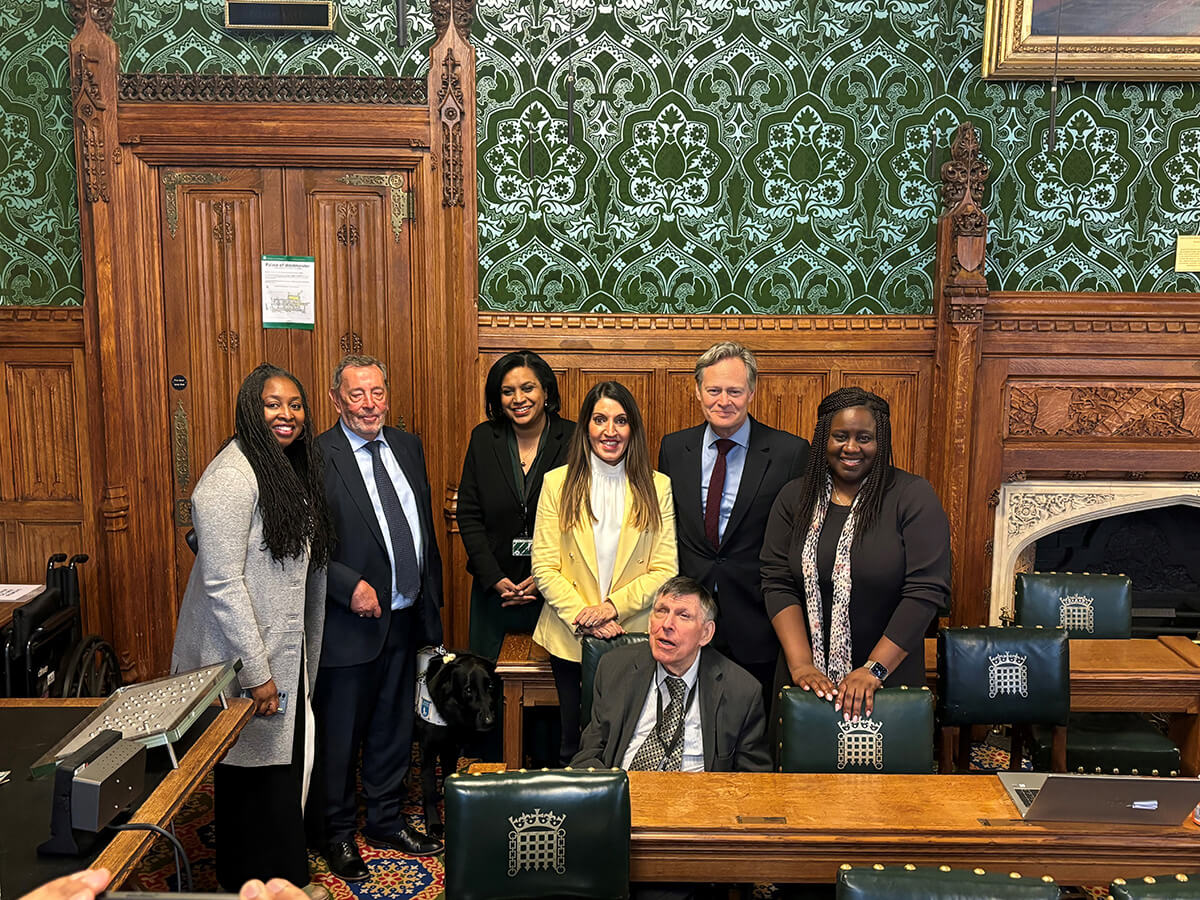22nd February 2023
-
Wed, 22nd Feb, 2023
-
4:00 pm

Room C, 1 Parliament Street
16:00, 22nd February 2023
Panelists:
Marsha De Cordova MP
Lord Blunkett
Joshua Feehan, Head of Internships, Thomas Pocklington Trust
Jeff Page, Head of Employment, Thomas Pocklington Trust
Roisin Jacklin, Policy Officer, RNIB
Margaret Hart, Fundraising Intern at MyVision Oxfordshire
Jill Barker & Eiluned Edwards – Experts by Experience
Overview
The APPG session looked into employment and the Access to Work scheme. Panelists and attendees discussed the advantages of the Access to Work scheme when it was deployed efficiently and highlighted the impact of delayed assessments and implementation had on people with sight loss.
Introduction
Marsha De Cordova MP began by reflecting on the previous APPG meeting about the collection of data. She said this week’s meeting was timely, in anticipation of the Government’s Health and Disability White Paper.
Marsha said there hadn’t been much progress on employment of blind and partially sighted people, reflecting on the rate of employment which had fallen from one in three to one in four.
Reflecting on the Access to Work scheme, Marsha said that whilst it did have flaws it did manage to do what it said on the tin – but that is when there are not delays. She said, though, that there should not be a cap on the level of support and should instead be flexible around of the needs of the person.
Continuity of support
Lord Blunkett called for continuity of support. He noted that not all young people have a health and care plan, but if they had, it should translate into access to work using the assessment that had already taken place. This should be able to be passported further when people change jobs, or progress in the job, rather than take the assessment again.
He said that if people were volunteering, access to work should be available and they should be able to passport the access to work equipment if they move on.
He concluded by reflecting situations where employers have taken someone on but find out they won’t immediately get the access to work support. He said the employee is then likely to be let go when their probation ends.
Marsha also noted the importance of continuity of support as people moved from education into work, as well as the portability of access to work equipment.
Delays to Access to Work
Roisin Jacklin talked through the Government’s Access to Work scheme and how delays to the scheme were placing disabled people’s jobs at risk. She reflected on the words of an employee with sight loss who said that access to work was helping them do their job, but the delays were impacting their work performance.
Roisin said that the RNIB was working with individuals that were experiencing delays as long as 6 months, including for one employee whose contract had expired before they even received their access to work support.
She said the delays were severely impacting their ability to stay in or secure work. One applicant, a teacher, was unable to take up a teaching post because they had been waiting 28 weeks for equipment. One employee’s support equipment had broken and the four months wait for a replacement meant they could not do many aspects of their job.
She relayed quotes from someone the organisation supports who was afraid they would lose their job due to the delay in receiving their access to work equipment. Jacqueline told the group that RNIB did not think that the actions taken by the DWP would do enough to reduce the waits. Although they were welcomed, they were not sufficient.
RNIB called for additional measures to be put in place and called for adequate resourcing for access to work to enable claims to be dealt with sufficiently as well as Ministerial targets to reach for access to work.
Marsha said the group would do all it can to help push on the RNIB’s recommendations and noted the importance of targets.
Employment Support
Jeff Page said the Thomas Pocklington Trust was dedicated to helping people find work, such as CV and interview training. He said the charity found that due to previous factors in people’s lives they often wouldn’t get assessed for the type of technology they needed to make them instinctive users in jobs that require technology. He said there were a number of programmes but people were often put onto the wrong ones.
He said this led to people having inadequate wok experience and therefore their CVs lacked work experience, so they facilitate that for people aged between 14-18 and reflected on a trainee who recently had work experience at the Financial Times.
Josh Feehan said that the Thomas Pocklington Trust had identified that employment was a big problem and apprenticeships would be a way to help fix that. He said over 20 people had been placed into internships across the country working with Thomas Pocklington, RNIB and the postcode lottery.
Josh wanted to make sure people were not just making tea and coffee but were working in sectors like finance, banking, journalism etc. With that, he said, apprentices were provided with mentors, training and after 3 months getting them together with the employment team to make sure people were staying on course and into employment.
He explained that they had found inconsistencies with how the access to work scheme was rolled out, noting that two people had vastly differing experiences in the same geographical area. The RNIB had helped provide temporary licenses for tech where assessments had not taken place for apprentices. He said there were still barriers in the private sector where employers still questioned “what can a blind person do?”
Margaret, who is currently a fundraising intern with MyVisionOxfordshire spoke next. Her sight loss has affected her ability to find a job and the apprenticeship has helped her to find one.
She said she had some support at school but very little of it was sight specific and this was the same at university. A career advisor responded to her with annoyance when she said that she could not do any jobs which involved driving. When applying for jobs she found it very difficult to get interviews, even jobs where she fitted very niche specifications. She said it was very demoralising and knocked her confidence.
Job applications were the biggest barrier and the requirement for driving would be especially large. She said the requirement to drive was often included when there was no obvious reason why driving was needed for the job.
The main thing was having work experience on her CV, as well as the skills she has learnt on the job. She said the experience of actually having a job provided a direction with a career in mind.
Jill Barker said she experienced a quick deterioration of her eye sight which led to the DVLA revoking her driving license in 2022. Due to remote working becoming more normalised she was able to continue her job remotely. Even still, her work has been impacted notably.
She said she can go to work for activities on campus and can be reimbursed for up to two journeys a week on the access to work scheme. However, she found this stressful, and the price was unsustainable.
Jill said that she was guided to the access to work scheme but the assessment was extremely stressful and had to take a month off of work. She was told she would have to do an entire new application because the travel component was not completed by the assessor despite this being the main aspect of her application.
She praised the work of the Macular Society for the support she had been provided which included counselling and peer support sessions. In terms of barriers, she challenged the reactive approach from employers and employees as well as a lack of understanding of what a reasonable adjustment is.
Eiluned Edwards told the group she had recently been diagnosed with a sight condition which affected her left eye at the moment but did not know what the long term diagnosis was.
She thought that she could just carry on with her research but the lack of access to research funding if you are not attached to an institution was a problem for her. However, she had since found a pot of funding which was available to researchers not attached to an institution.
She said she worked with a local charity, MySight, which helped provide her with support. She had tried to work with occupational health at work but they did not know much about helping with vision loss. Also, she said there was open hostility from line managers.
She said there was a nine month wait for her application to access to work and she ran out of patience with the system. She asked for the equipment to be ported over to another employer but she was told she would need to go back to square one and was concerned by the start of another nine month long process.
She said the emotional impact was huge, because she felt as though she was unemployable. Though, she has since done some work for the University of New South Wales and for a publication in India.
She said she resigned from her Union because she felt unsupported by them.
Summary and Next Steps
The APPG officers will be writing to the Minister on this matter.
Marsha will also apply for a Westminster Hall on this topic.
The publication of the Governments Health and Disability White Paper is expected at any time.
The APPG on Eye Health and Visual Impairment will await the detail of this, and look to hold a follow up meeting on Employment later in the year.
The APPG is also working with several university researchers to explore work on employer attitudes.
APPG Announcements’
All future meetings will be taking place 2pm – 4pm. The next meeting will be on Wednesday 26th April. The AGM will also form part of this meeting.
The next meeting will be in PERSON only.
A formal invite will be sent out in the coming weeks, however if you would like to RSVP for the April meeting now please email: contact@eyehealthviappg.org.uk
One of the priority areas for the APPG over the next 18 months is to look at the Eye Care Pathway. There will be several parts to this work with the first meeting focusing on ensuring an adequate eye health workforce to meet to meet the needs of our population – now and in the future. We will be exploring this in the April meeting.
Minutes of recent meetings
22nd February 2023
The APPG session looked into employment and the Access to Work scheme. Panelists and attendees discussed the advantages of the Access to Work scheme when it was deployed efficiently and highlighted the impact of delayed assessments and implementation had on people with sight loss.
26th April 2023
The APPG session discussed the eye care workforce and explored current challenges, opportunities and recommendations for the eye care workforce needed now, and in the future.
T* APPG Meeting (Eye Health) and AGM 2-4pm, Parliament
The Eye Health and Visual Impairment held its AGM on Tuesday 19th March.



